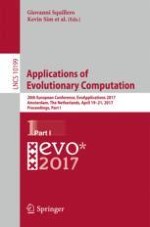2017 | OriginalPaper | Buchkapitel
Evolutionary Adaptation to Social Information Use Without Learning
verfasst von : James M. Borg, Alastair Channon
Erschienen in: Applications of Evolutionary Computation
Aktivieren Sie unsere intelligente Suche, um passende Fachinhalte oder Patente zu finden.
Wählen Sie Textabschnitte aus um mit Künstlicher Intelligenz passenden Patente zu finden. powered by
Markieren Sie Textabschnitte, um KI-gestützt weitere passende Inhalte zu finden. powered by
